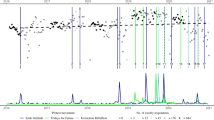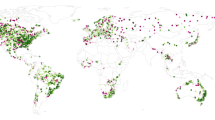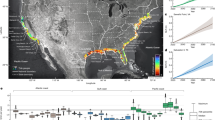Abstract
The Paris Agreement and Katowice Climate Package articulate a clear mandate for all parties to undertake and document adaptation progress. Yet persistent challenges have prevented substantive developments in tracking adaptation and the assessment of adaptation actions and their outcomes. Here, we provide an overview of the challenges of adaptation tracking and propose a comprehensive conceptual framework for assessing adaptation progress by governments that is scalable over time and across contexts. The framework addresses the core components of adaptation assessment (vulnerability, goals and targets, adaptation efforts, and adaptation results) and characterizes subcomponents focused on adaptation effort (leadership, organizations and policy). In particular, we highlight how critical insights can be uncovered by systematically tracking policy efforts over time, and discusses novel approaches to data collection.
This is a preview of subscription content, access via your institution
Access options
Access Nature and 54 other Nature Portfolio journals
Get Nature+, our best-value online-access subscription
$29.99 / 30 days
cancel any time
Subscribe to this journal
Receive 12 print issues and online access
$209.00 per year
only $17.42 per issue
Buy this article
- Purchase on Springer Link
- Instant access to full article PDF
Prices may be subject to local taxes which are calculated during checkout



Similar content being viewed by others
References
de Coninck, H. et al. in IPCC Special Report: Global warming of 1.5 °C (eds Masson-Delmotte, V. et al.) Ch. 4 (IPCC, Cambridge Univ. Press, 2018).
Magnan, A. K. & Ribera, T. Global adaptation after Paris. Science 352, 1280–1282 (2016).
Lesnikowski, A. et al. What does the Paris Agreement mean for adaptation? Clim. Policy 17, 825–831 (2017).
Magnan, A. K. Climate change: metrics needed to track adaptation. Nature 530, 160–160 (2016).
Ford, J. D. et al. Adaptation tracking for a post-2015 climate agreement. Nat. Clim. Change 5, 967–969 (2015).
Berrang-Ford, L., Ford, J. D. & Paterson, J. Are we adapting to climate change? Glob. Environ. Change 21, 25–33 (2011).
Ford, J. D. & Berrang-Ford, L. The 4Cs of adaptation tracking: consistency, comparability, comprehensiveness, coherency. Mitig. Adapt. Strat. Gl. 21, 839–859 (2016).
Ford, J. D., Berrang-Ford, L., Lesnikowski, A., Barrera, M. & Heymann, S. J. How to track adaptation to climate change: a typology of approaches for national-level application. Ecol. Soc. 18, 40 (2013).
Surminski, S. Private sector adaptation to climate risk. Nat. Clim. Change 3, 943–945 (2013).
Chen, C., Hellmann, J., Berrang-Ford, L., Noble, I. & Regan, P. A global assessment of adaptation investment from the perspectives of equity and efficiency. Mitig. Adapt. Strat. Gl. 23, 101–122 (2018).
Dupuis, J. & Biesbroek, R. Comparing apples and oranges: the dependent variable problem in comparing and evaluating climate change adaptation policies. Glob. Environ. Change 23, 1476–1487 (2013).
Ford, J. D., Berrang-Ford, L. & Patterson, J. A systematic review of observed climate change adaptation in developed nations. Clim. Change Lett. 106, 327–336 (2011).
UNEP. Adaptation Gap Report 2017 (United Nations Environment Programme, 2017).
Tompkins, E. L., Vincent, K., Nicholls, R. J. & Suckall, N. Documenting the state of adaptation for the global stocktake of the Paris Agreement. WIRES Clim. Change 9, e545 (2018).
Bours, D., McGinn, C. & Pringle, P. Monitoring and evaluation of climate change adaptation: a review of the landscape. New Dir. Eval. 147, 1–12 (2015).
Fisher, S., Dinshaw, A., McGray, H., Rai, N. & Schaar, J. Evaluating climate change adaptation: learning from methods in international development. New Dir. Eval. 2015, 13–35 (2015).
Chen, C., Doherty, M., Coffee, J., Wong, T. & Hellmann, J. Measuring the adaptation gap: a framework for evaluating climate hazards and opportunities in urban areas. Environ. Sci. Pol. 66, 403–419 (2016).
Brooks, N. et al. An operational framework for Tracking Adaptation and Measuring Development (TAMD) (IIED, 2013).
Lesnikowski, A., Ford, J., Biesbroek, R., Berrang-Ford, L. & Heymann, S. J. National-level progress on adaptation. Nat. Clim. Change 6, 261–264 (2016).
Lesnikowski, A. C., Ford, J. D., Berrang-Ford, L., Barrera, M. & Heymann, J. How are we adapting to climate change? a global assessment. Mitig. Adapt. Strat. Gl. 20, 277–293 (2015).
Gagnon-Lebrun, F. & Agrawala, S. Implementing adaptation in developed countries: an analysis of progress and trends. Clim. Policy 7, 392–408 (2007).
Araos, M., Ford, J., Berrang-Ford, L., Biesbroek, R. & Moser, S. Climate change adaptation planning for Global South megacities: the case of Dhaka. J. Environ. Pol. Plan. 19, 682–696 (2017).
Heidrich, O. et al. National climate policies across Europe and their impacts on cities strategies. J. Environ. Manag. 168, 36–45 (2016).
Preston, B. L., Westaway, R. M. & Yuen, E. J. Climate adaptation planning in practice: an evaluation of adaptation plans from three developed nations. Mitig. Adapt. Strat. Gl. 16, 407–438 (2011).
Woodru, S. C. & Stults, M. Numerous strategies but limited implementation guidance in US local adaptation plans. Nat. Clim. Change 6, 796–802 (2016).
Reckien, D. et al. Climate change response in Europe: what’s the reality? analysis of adaptation and mitigation plans from 200 urban areas in 11 countries. Clim. Change 122, 331–340 (2014).
Jude, S. R. et al. Delivering organisational adaptation through legislative mechanisms: evidence from the Adaptation Reporting Power (Climate Change Act 2008). Sci. Total Environ. 574, 858–871 (2017).
Townshend, T. et al. How national legislation can help to solve climate change. Nat. Clim. Change 3, 430–432 (2013).
Wang, F. M. et al. in Adaptation metrics: perspectives on measuring, aggregating and comparing adaptation results (eds Christiansen, L. et al.) 49–62 (UNEP DTU Partnership, 2018).
Lamhauge, N., Lanzi, E. & Agrawala, S. The use of indicators for monitoring and evaluation of adaptation: lessons from development cooperation agencies. Clim. Dev. 5, 229–241 (2013).
Harley, M., Horrocks, L., Hodgson, N. & Van Minnen, J. ETC/ACC Technical Paper 2008/9 (European Environmental Agency, 2008).
Biesbroek, R., Dupuis, J. & Wellstead, A. Explaining through causal mechanisms: resilience and governance of social-ecological systems. Curr. Opin. Environ. Sust. 28, 64–70 (2017).
Peters, B. G. & Pierre, J. Comparative governance: Rediscovering the functional dimension of governing (Cambridge Univ. Press, 2016).
Treib, O., Bahr, H. & Falkner, G. Modes of governance: towards a conceptual clarification. J. Eur. Pub. Pol. 14, 1–20 (2007).
Leiter, T. Recommendations for Adaptation M&E in Practice: Discussion Paper (GIZ, 2013).
Ford, J. D. et al. Vulnerability and its discontents: the past, present, and future of climate change vulnerability research. Clim. Change 151, 189–203 (2018).
Biesbroek, R., Lesnikowski, A., Ford, J. D., Berrang-Ford, L. & Vink, M. Do administrative traditions matter for climate change adaptation policy? A comparative analysis of 32 high-income countries. Rev. Pol. Res. 35, 881–906 (2018).
Klijn, E. H. & Koppenjan, J. Governance networks in the public sector (Routledge, 2016).
Tilleard, S. & Ford, J. Adaptation readiness and adaptive capacity of transboundary river basins. Clim. Change 137, 575–591 (2016).
Ford, J. D. & King, D. A framework for examining adaptation readiness. Mitig. Adapt. Strat. Gl. 20, 505–526 (2015).
Smith, J. B., Vogel, J. M. & Cromwell, J. E. An architecture for government action on adaptation to climate change. Clim. Change 95, 53–61 (2009).
Ekstrom, J., Bedsworth, L. & Fencl, A. Gauging climate preparedness to inform adaptation needs: local level adaptation in drinking water quality in CA, USA. Clim. Change 3, 467–481 (2017).
Sovacool, B., Linner, B. O. & Goodsite, M. E. The political economy of climate adaptation. Nat. Clim. Change 5, 616–618 (2015).
Eriksen, S. H., Nightingale, A. J. & Eakin, H. Reframing adaptation: the political nature of climate change adaptation. Glob. Environ. Change 35, 523–533 (2015).
Chu, E. The political economy of urban climate adaptation and development planning in Surat, India. Environ. Plann. C. 34, 281–298 (2016).
Green, J. F. Policy entrepreneurship in climate governance: Toward a comparative approach. Environ. Plann. C. 35, 1471–1482 (2017).
Jordan, A. J. et al. Emergence of polycentric climate governance and its future prospects. Nat. Clim. Change 5, 977–982 (2015).
Keohane, R. O. & Victor, D. G. Cooperation and discord in global climate policy. Nat. Clim. Change 6, 570–575 (2016).
Hsu, A., Weinfurter, A. J. & Xu, K. Y. Aligning subnational climate actions for the new post-Paris climate regime. Clim. Change 142, 419–432 (2017).
Backstrand, K. & Kuyper, J. W. The democratic legitimacy of orchestration: the UNFCCC, non-state actors, and transnational climate governance. Environ. Pol. 26, 764–788 (2017).
Hall, P. Policy, paradigms, social learning, and the State: the case of economic policymaking in Britain. Comp. Polit. 25, 275–296 (1993).
Pelling, M. & Dill, K. Disaster politics: tipping points for change in the adaptation of sociopolitical regimes. Prog. Hum. Geogr. 34, 21–37 (2010).
Greiving, S. & Fleischhauer, M. National climate change adaptation strategies of European states from a spatial planning and development perspective. Eur. Plan. Stud. 20, 27–48 (2012).
Henstra, D. The tools of climate adaptation policy: analysing instruments and instrument selection. Clim. Pol. 16, 496–521 (2016).
Audinet, P., Amado, J.-C. & Rabb, B. in Weather Matters for Energy (eds Troccoli, A., Dubus, L. & Haupt, S. E.) 17–64 (Springer, 2014).
Lesnikowski, A. et al. Frontiers in data analytics for adaptation research: topic modeling. WIRES Clim. Change 10, e576 (2019).
Siders, A. R. A role for strategies in urban climate change adaptation planning: lessons from London. Reg. Environ. Change 17, 1801–1810 (2017).
Scott, W. R. Institutions and organisations: ideas and interests 3rd edn (Sage Publications, 2008).
Steurer, R. & Clar, C. The ambiguity of federalism in climate policy-making: how the political system in Austria hinders mitigation and facilitates adaptation. J. Environ. Pol. Plan. 20, 252–265 (2018).
Runhaar, H., Wilk, B., Persson, A., Uittenbroek, C. & Wamsler, C. Mainstreaming climate adaptation: taking stock about “what works” from empirical research worldwide. Reg. Environ. Change 18, 1201–1210 (2018).
Burch, S. Transforming barriers into enablers of action on climate change: insights from three municipal case studies in British Columbia, Canada. Glob. Environ. Change 20, 287–297 (2010).
Biesbroek, G. R., Klostermann, J. E. M., Termeer, C. J. A. M. & Kabat, P. On the nature of barriers to climate change adaptation. Reg. Environ. Change 13, 1119–1129 (2013).
Wellstead, A. & Howlett, M. Assisted tree migration in North America: policy legacies, enhanced forest policy integration and climate change adaptation. Scand. J. Res. 32, 535–543 (2017).
Vij, S. et al. Climate adaptation approaches and key policy characteristics: cases from South. Asia. Enviro. Sci. Pol. 78, 58–65 (2017).
Mukheibir, P., Kuruppu, N., Gero, A. & Herriman, J. Overcoming cross-scale challenges to climate change adaptation for local government: a focus on Australia. Clim. Change 121, 271–283 (2013).
Bauer, A., Feichtinger, J. & Steurer, R. The governance of climate change adaptation in 10 OECD countries: challenges and approaches. J. Environ. Pol. Plan. 14, 279–304 (2012).
Howlett, M. & Cashore, B. The dependent variable problem in the study of policy change: understanding policy change as a methodological problem. J. Comp. Pol. Anal. 11, 33–46 (2009).
Macintosh, A., Foerster, A. & McDonald, J. Policy design, spatial planning and climate change adaptation: a case study from Australia. J. Environ. Plan. Manag. 58, 1432–1453 (2015).
Schaffrin, A., Sewerin, S. & Seubert, S. Toward a comparative measure of climate policy output. Pol. Stud. J. 43, 257–282 (2015).
Vogel, B. & Henstra, D. Studying local climate adaptation: a heuristic research framework for comparative policy analysis. Glob. Environ. Change 31, 110–120 (2015).
Mees, H. L. P. et al. A method for the deliberate and deliberative selection of policy instrument mixes for climate change adaptation. Ecol. Soc. 19, 58 (2014).
Lampis, A. Cities andclimate change challenges: institutions, policy style and adaptation capacity in Bogota. Int. J. Urban Reg. Res. 37, 1879–1901 (2013).
Howlett, M. Policy instruments, policy styles, and policy implementation — national approaches to theories of instrument choice. Pol. Stud. J. 19, 1–21 (1991).
Howlett, M. Administrative styles and the limits of administrative reform: A neo-institutional analysis of administrative culture. Can. Public Admin. 46, 471–494 (2003).
Hood, C. C. The Tools of Government. (Macmillan, 1983).
Linder, S. H. & Peters, B. G. Instruments of government: perceptions and contexts. J. Public Policy 9, 35–58 (1989).
Knill, C. European policies: the impact of national administrative traditions. J. Public Policy 18, 1–28 (1998).
Adapting to the impacts of climate change (Office of the Auditor General of Canada, 2017).
Indicators of Climate Change for British Columbia: 2016 Update (BC Ministry of the Environment and Climate Change Strategy, 2016).
Preparing for Climate Change: British Columbia’s Adaptation Strategy (BC Ministry of the Environment and Climate Change Strategy, 2010).
Addressing Climate and Health Risks in BC: Climate Change Health Risks (BC Ministry of the Environment and Climate Change Strategy, 2019).
Addressing Climate and Health Risks in BC: Public Health (BC Ministry of the Environment and Climate Change, 2019).
Kosatsky, T., Henderson, S. B. & Pollock, S. L. Shifts in mortality during a hot weather event in Vancouver, British Columbia: rapid assessment with case-only analysis. Am. J. Pub. Health 102, 2367–2371 (2012).
Austin, S. E. et al. Intergovernmental relations for public health adaptation to climate change in the federalist states of Canada and Germany. Glob. Environ. Change 52, 226–237 (2018).
Greenest City 2020 Action Plan (City of Vancouver, 2012).
Ford, J. D. et al. Big data has big potential for applications to climate change adaptation. Proc. Natl Acad. Sci. USA 113, 10729–10732 (2016).
Biesbroek, R. et al. Data, concepts and methods for large-n comparative climate change adaptation policy research: a systematic literature review. WIRES Clim. Change 9, e548 (2018).
Managing Climate Change Risks: An Independent Audit (BC Office of the Auditor General, 2018).
Climate Change Accountability Act, SBC 2007 Ch. 42 (Government of British Columbia, 2007).
Acknowledgements
The collaboration has been funded by SSHRC, CIHR and Yale-NUS. R.B.’s contribution was partly funded through NWO-VENI (451-17-006-4140). Special thanks to S. Coggins for contributions to the case-study. The funders had no role in the conceptualization, design, data collection, analysis, decision to publish or preparation of the manuscript.
Author information
Authors and Affiliations
Contributions
The work presented in this paper was guided by a series of collaborative discussions and workshops within the Adaptation Tracking Collaborative (ATC). Launched as a collaboration of the Tracking Adaptation to Climate Change Consortium (TRAC3, McGill University, University of Leeds and Wageningen University), the Global Adaptation Initiative at the University of Notre-Dame (ND-GAIN), the University of California Los Angeles (UCLA) WORLD Policy Analysis Center, the Institute of Environment at the University of Minnesota and in collaboration with Yale-NUS College (Singapore). The ATC hosted three workshops with the goal of: assessing adaptation tracking needs, identifying a common goal, articulating key theoretical and methodological challenges, and collectively outlining a preliminary conceptual framework for global and systematic adaptation tracking. This paper is the result of those discussions. L.B.F., R.B., J.D.F. and A.L. conceived of the study. Conceptual development of the study goals, objectives and an outline of the framework were contributed collectively by all authors over a series of three workshop meetings. These meetings provided the important intellectual content and interpretation of existing literature to develop a first draft. L.B.F. led manuscript writing, with substantial portions of text written by R.B., A.L. and J.D.F.; A.L., R.B., L.B.F., A.T. and F.M.W. contributed to case-study data collection and/or analysis. All authors critically revised the manuscript for important intellectual content over numerous drafts and teleconferences.
Corresponding author
Ethics declarations
Competing interests
The authors declare no competing interests
Additional information
Journal peer review information: Nature Climate Change thanks Nathan Engle, Tim Smith and other anonymous reviewer(s) for their contribution to the peer review of this work.
Publisher’s note: Springer Nature remains neutral with regard to jurisdictional claims in published maps and institutional affiliations.
Rights and permissions
About this article
Cite this article
Berrang-Ford, L., Biesbroek, R., Ford, J.D. et al. Tracking global climate change adaptation among governments. Nat. Clim. Chang. 9, 440–449 (2019). https://doi.org/10.1038/s41558-019-0490-0
Received:
Accepted:
Published:
Issue Date:
DOI: https://doi.org/10.1038/s41558-019-0490-0
This article is cited by
-
The next generation of machine learning for tracking adaptation texts
Nature Climate Change (2024)
-
Revisiting Copenhagen climate mitigation targets
Nature Climate Change (2024)
-
Ageing population and green space dynamics for climate change adaptation in Southeast Asia
Nature Climate Change (2024)
-
Optimization of the parallel semi-Lagrangian scheme to overlap computation with communication based on grouping levels in YHGSM
CCF Transactions on High Performance Computing (2024)
-
Energy security of the European Union and corruption in Central Asia as the main challenges for the European sustainable energy future
Energy, Sustainability and Society (2023)



